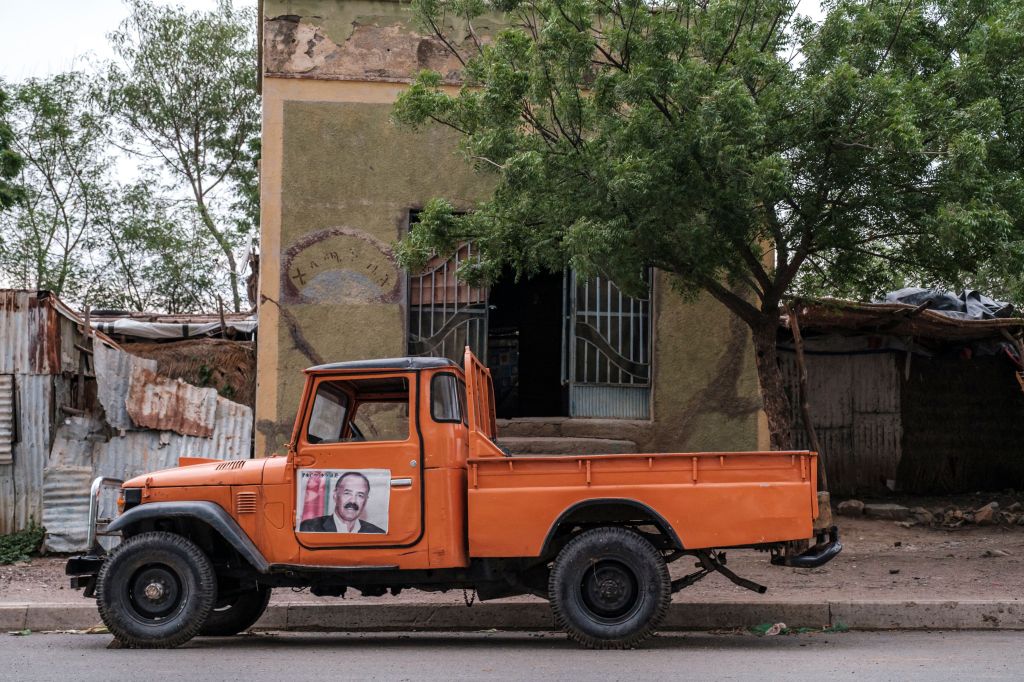In 2018, Ethiopian Prime Minister Abiy Ahmed emerged as one of the most popular leaders in Africa after introducing rapid political, economic and social reforms. He freed thousands of political prisoners, welcomed back exiled opposition members, encouraged a free press, appointed the country’s first woman president and constituted a gender-balanced cabinet.
And for his efforts at making peace with neighbour Eritrea, a long time foe, Abiy won the Nobel Peace Prize. The rapprochement with Eritrea ended a two-decade stalemate sparked by a two-year border war that killed over 100,000 people.
Videos by VICE
A lot has changed since then.
In recent months, Abiy has shut down the internet and ordered the arrest of thousands of people, including prominent opposition politicians and journalists. In early July, security forces raided media organisations for allegedly inciting violence, in a week that saw at least 167 people killed following protests that broke out after the pop star and activist Hachalu Hundessa was assassinated.
In June, lawmakers postponed general elections initially scheduled for August, and almost indefinitely extended their terms, raising tensions further. Opposition politicians have called for protests on the 10th of October, when the current mandate for the government was set to end. On top of all this, last week Eritrea said the peace deal is falling short – trade and economic activities have not resumed as planned, and Eritrea is accusing Ethiopian troops of still occupying its territory.
Experts say Abiy is turning to strongman tactics in frustration, amid an increase of ethnic violence, abductions and a growing number of militant and regional groups intensifying their call for self-determination, challenging the peace in a country of 110 million people. Meanwhile, rights groups accuse the country’s security forces of extrajudicial killings.
It’s becoming clear that two years of reconciliation efforts with both Ethiopia’s former leadership and opposition politicians, towards a democratic and peaceful country, are failing. “We have always held that he is a double-edged sword. He did his ‘reform’ to pour off the fire, but not solve the issue,” Mugo Mugo, a peace and security analyst in East Africa, tells VICE News.
Ethiopia is not unaccustomed to instability. National protests were sparked from 2014 by plans to expand the capital, Addis Ababa, to parts of the neighbouring Oromia region. The protesters advocated for the rights of the Oromo people, the largest ethnic group in the country, which was marginalised by the leading members of Ethiopia’s former ruling coalition, the Tigray People’s Liberation Front (TPLF). The music of Hachalu Hundessa – who was assassinated in June – became the soundtrack to that movement.
Three years of anti-government protests leading up to 2018 forced the previous prime minister, Hailemariam Desalegn, to resign in February of 2018, paving the way for Abiy. At the end of 2019, Abiy disbanded the ruling Ethiopian People’s Revolutionary Democratic Front, a four-part coalition representing the country’s major ethnic groups – including the TPLF and the Oromo Democratic Party, Abiy’s former party – and consolidated power under a new party, the Prosperity Party.
The TPLF and the Prosperity Party blame each other for the country’s problems. Abiy claims the TPLF are responsible for the insecurity and political tension in the country, calling them “aggrieved forces”. TPLF calls Abiy a dictator, and has vowed to go ahead with regional elections despite a lack of support from the country’s electoral board.
“Ethiopia bears all the hallmarks of a nation sliding into civil conflict in slow motion. The world can either pretend things are not that bad and look away, or it can invest now in some serious concerted action to avert potential disaster. Ethiopia is too big to fail,” Rashid Abdi, a security researcher in the Horn of Africa, said on Twitter.
Abiy is still paying lip service to democracy and the prospect of free, fair and credible elections. “Ethiopia’s transition from an autocratic state to a nascent democracy is underway and is inevitable,” the Prime Minister’s Office said this week in a statement.
Last week, the Attorney General underlined the need for firm enforcement of the rule of law in the country. Over the past two-and-a-half years, patience, restraint and clemency shown by the government were taken as weaknesses by the opposition.
So far, more than 4,700 protesters and key opposition politicians have been arrested, including prominent activist and opposition leader Jawar Mohammed, as well as Bekele Garber, charged for inciting violence.
Since the assassination of Hachalu on the 29th of June, the government claims to have arrested two people who have confessed to the crime as being part of a plot to incite ethnic tension and overthrow the government.
The internet has been shut down since the 30th of June.
The government has deployed the army across the capital, Addis Ababa, and in key towns across the Oromia region. Abiy, an ethnic Oromo himself, says the Oromo people are free and do not need an armed struggle. Add the biblical-sized swarms of desert locusts and a diplomatic row with Egypt over a dam on the River Nile, which could escalate into conflict, and you can understand why many in Ethiopia are hoping Abiy quickly regains his desire for peace.




